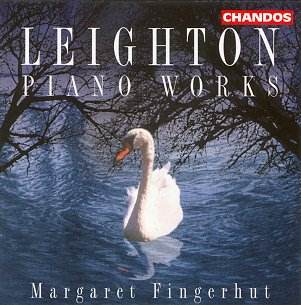Kenneth LEIGHTON: Sonatina No.2, Five Studies Op.22, Fantasia
Contrappuntistica Op.24, Pieces for Angela Op.47, Four Romantic Pieces
Op.95
 Margaret Fingerhut
(piano)
Margaret Fingerhut
(piano)
 CHANDOS CHAN 9818 [67'
12"]
CHANDOS CHAN 9818 [67'
12"]

Wakefield-born Kenneth Leighton (1929-1988) was an excellent pianist himself.
His idiomatic writing for the piano is apparent throughout this fine recital
by the ever-adventurous Margaret Fingerhut.
Leighton was a prolific composer who wrote for orchestra (there are three
symphonies), chamber groups, choirs, solo voices and, of course, piano. There's
enough music in this last category for Fingerhut to make a second CD, which
I hope she will.
What stands out in the choice of pieces for this CD is the variety of expression
Leighton commands within the individual frameworks of these diverse works.
There's a linear clarity to his writing that allows the most complex of passages
to remain lucid for the listener, and Leighton's musical language, while
quite personal harmonically, is assuredly romantic and lyrical. Leighton's
constantly engaging material is tightly controlled and always clear in its
direction.
Leighton's use of traditional forms, of which he demonstrates impressive
command, and his contrapuntal mastery, does not inhibit him from writing
music that is powerfully communicative and suggestive. Leighton is very much
his own man, but for reference I would suggest that Hindemith and Prokofiev
(and to a lesser extent Bartok) might be heard as external influences, with
Lennox Berkeley and Walton as ones closer to home.
For all his clarity of thought, Leighton uses the full compass of the piano,
relishing the extended tonal palette that Liszt and Busoni savoured. The
powerful, dark Four Romantic Pieces (really a four-movement Sonata) are intense,
troubled, meditative and fiercely rhythmic. The initially sparse world of
the third piece has a hypnotic atmosphere all its own. Forty years earlier,
the 1947 Sonatina No.2 is pungently expressive, rhythmically ingenious and
attractively good-natured. The slow movement's simple song is very touching.
The Five Studies are serious in mood and satisfyingly complex for the listener.
After the relatively straightforward writing of the Sonatina, the demands
placed upon the pianist in these Studies are considerable - Fingerhut is
not found wanting. A very young Maurizio Pollini (just 14) premiered the
Fantasia Contrappuntistica in 1956. In this `homage to Bach' Leighton extends
the Bach/Busoni legacy in a single movement of contrasting sections that
build a constantly evolving structure, one that is powerfully cumulative
and rigorously controlled. A worthy companion to Busoni's piano work of the
same name. The eight exquisite miniatures that make up Pieces for Angela
could not offer more contrast. Simple, witty, beguiling and characteristic,
Leighton speaks directly to the listener and holds the attention because
he has something intrinsic to say and says it with the minimum of fuss but
with considerable warmth and charm.
Not having heard too much of Leighton's music in the past, this CD has been
a revelation to me. This is seriously good music. Fingerhut's renditions
and Chandos's sound are respectively devoted and excellent. If you still
need persuading then I must borrow from Bryce Morrison's notes when he quotes
that Leighton's `distinctive music satisfies the intellect as it liberates
the spirit'.
Reviewer
Colin Anderson

